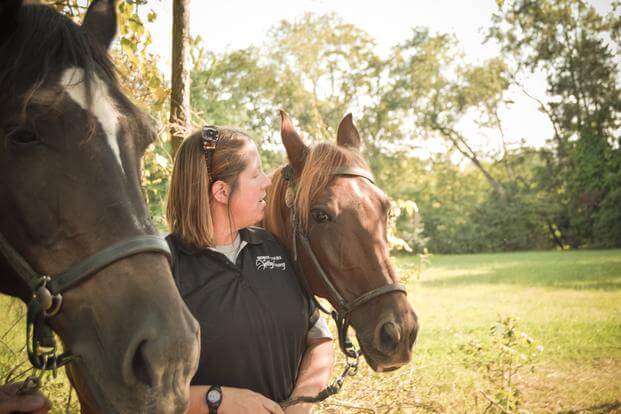You've heard it before; if you do what you love, you'll never have to work a day in your life. And that's exactly what combat medic Doug Stephens and his wife, Lt. Col. Rachel Stephens, did when they turned their love of horses into a thriving tourism business.
The Stephenses have operated Confederate Trails of Gettysburg, providing horseback rides and horse-drawn carriage tours of the Gettysburg Battlefield, since 2010. Rachel and Doug, who both had distinguished military careers (Army, Air Force and Air National Guard), knew that others would benefit, as they did, from riding and learning how to care for horses.
Their business is an example of how veterans can strike out on their own to form a successful entrepreneurial venture.
Their secret? Harness your passion, connect with other veterans, get in the saddle and be persistent.
'A Horse Is a Horse, of Course, of Course'
Horses figure prominently in military history. They've carried soldiers through war zones and endured countless hardships with their riders.
One of the most famous American war horses ever, Sgt. Reckless, was a Marine. During the five-day Battle for Outpost Vegas in the Korean War, she made 51 ammunition resupply trips 95% of the time by herself. She carried 386 rounds of ammunition (nearly five tons) and walked more than 35 miles through open rice paddies and up steep mountains, with enemy fire coming in at the rate of 500 rounds per minute.
And as she so often did, she carried wounded soldiers down the mountain to safety. After they were unloaded, she was reloaded with ammo, and off she would go back up to the guns. She wasn't a horse; she was a Marine.
"Horses aren't worried about 15 different appointments during the day," Doug said. "They just are what they are, when they are." Doug says horses help him connect when he feels disconnected, and when he's out riding, he lets go and, like the horse, is in the moment. And, he says, he gets to share his love of horses and history with visitors and veterans.

“Doug does not trust easily. Patriot, his beautiful Percheron cross gelding, does not trust easily either,” says Rachel, “but Patriot will do anything that Doug asks of him because of the trust they developed with patience and time.”
Doug and Rachel knew they wanted to let veterans experience the healing power of horses and reached out to a local vet center, organizing rides for combat veterans.
“It's just peaceful,” Army combat veteran Robert McCready said in an interview with a local CBS affiliate. “It's easy to let go, forget about your problems and relax." McCready says he had a tough time readjusting to civilian life after two tours in Afghanistan, but riding with other veterans helped him feel connected again.
It's easy to see why horse therapy works. When you are up in the saddle, your problems don't seem as significant. It's an incentive to reconnect to your own sense of self-confidence in giving orders and leading.
When you do, the horse will follow.
3 Ways Horses Help Heal
1. A Horse Is Your Partner. You Ride Together, Not Alone.
Anyone who's been in the military knows that a partner or “battle buddy” is essential to survival. Rachel says that “when veterans return from deployments, it is often very difficult for them to reconnect. To plug in emotionally even with those they are close,” is challenging.
Horses break down those emotional barriers. They don't have to try; they just do. The Stephenses say that you can see and feel when you connect with the horse. Everyone wins.
2. It Gives You New Memories.
As veterans work to reintegrate into civilian life, they may struggle with intense and vivid memories from combat. “Riding through creeks or on hillsides,” said Doug, “you pop out of the woods, and all of a sudden, you have majestic vistas in front of you.”
One might imagine it's like seeing Yosemite Valley or the Grand Canyon for the first time. Moments such as these give veterans time to pause and reflect, and they can be an effective coping mechanism to overcome a triggered emotion.
3. It's Just Fun.
You feel exhilarated and smile when your horse breaks into a gallop or jumps over an obstacle. Escaping from daily life on the back of a good horse can go a long way in helping heal a war-weary mind and body.
4. ‘Horsing Around’
Rachel and Doug believe that to do well in business, you need to do good. And they have some solid advice for veterans looking to turn their passions into a business.
Doug: “Don't sell yourself short. You've got the leadership and logistics, and you have already proven your drive and determination. In business, there are many state, local and federal regulations that you have to navigate. You've done that for years. You understand how the military works; the government is very similar.
“Military veterans have pride of ownership in their business in the same way that they have pride in their unit. Your attention to detail will differentiate your business from the next business down the road. People who served are better equipped to adapt, improvise and overcome. Look at a problem, develop a solution and make things happen. You are hard-wired to take care of your people. Go with that.”
Rachel: “Analyze your real strengths. Find appropriate people to task out the things you aren't strong in. For instance, a good accountant is worth their weight in gold. Find resources. Take time to do after-action reviews; whether it's annually or seasonally, you have to evaluate your practices and adjust as necessary.
“But never lose sight of what is important. No business is worth the sacrifice of your family. We happened to choose a business where our children can participate [usually they even like it, too!]. Remember that your company's success is not more important than your family's success. I would shut it all down tomorrow if that is what was best for my kids.”
Horses carried soldiers through battle and are still carrying them to safety today -- through patience, trust, and companionship. For more information on the Stephenses' organization, visit Confederate Trails of Gettysburg.
Find the Right Veteran Job
Whether you want to polish your resume, find veteran job fairs in your area or connect with employers looking to hire veterans, Military.com can help. Subscribe to Military.com to have job postings, guides and advice, and more delivered directly to your inbox.












